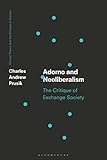Adorno and neoliberalism:
Material type: TextSeries: Critical theory and the critique of society seriesPublication details: New Delhi: Bloomsbury Academic, 2020Description: xii, 188pISBN:
TextSeries: Critical theory and the critique of society seriesPublication details: New Delhi: Bloomsbury Academic, 2020Description: xii, 188pISBN: - 9781350197282
- 148 PRU
 Book
Book
| Item type | Current library | Call number | Status | Date due | Barcode | |
|---|---|---|---|---|---|---|
 Book
Book
|
IIM Kashipur | 148 PRU (Browse shelf(Opens below)) | Available | 10281 |
Includes bibliographic references and index.
The first book to investigate the relevance of Theodor W. Adorno's work for theorizing the age of neoliberal capitalism. Through an engagement with Adorno's critical theory of society, Charles Prusik advances a novel approach to understanding the origins and development of neoliberalism. Offering a corrective to critics who define neoliberalism as an economic or political doctrine, Prusik argues that Adorno's dialectical theory of society can provide the basis for explaining the illusions and forms of domination that structure contemporary life.
Prusik explains the importance of Marx's critique of commodity fetishism in shaping Adorno's work and focuses on the related concepts of exchange, ideology, and natural history as powerful tools for grasping the present. Through an engagement with the ideas of neoliberal economic theory, Adorno and Neoliberalism criticizes the naturalization of capitalist institutions, social relations, ideology, and cultural forms. Revealing its origins in the crises of the Fordist period, Prusik develops Adorno's analyses of class, exploitation, monopoly, and reification to situate neoliberal policies as belonging to the fundamental antagonisms of capitalist society.
There are no comments on this title.

